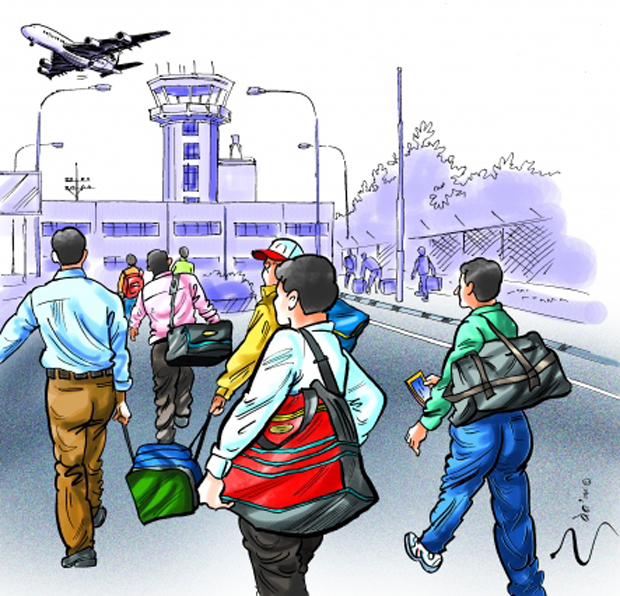In a globalized economy, foreign employment has become an important source of income for many countries. For Nepal, foreign employment is a vital part of the economy, accounting for a significant portion of the country’s GDP. Nepal is a landlocked country with limited resources and a large population. Foreign employment provides an important source of income for Nepal, which can be used to improve the country’s infrastructure and provide essential services to its citizens. Moreover, foreign employment also helps to reduce the country’s trade deficit and balance of payments.
The employment of foreign workers in Nepal helps to alleviate poverty. A foreign worker is someone who leaves his or her home country to work and earn money in another country. Make sure you understand the warning signs when going for foreign employment and how Nepal can benefit from more foreign workers. This will necessitate the involvement of the government, Manpower Company, and civil society in order to ensure a smooth transition of foreign workers. Lack of efficient personnel slows down the development process. It may result in the spread of a wide range of infectious diseases. Social evil can cause social unity to erode.
“In a globalized economy, foreign employment has become an important source of income for many countries. For Nepal, foreign employment is a vital part of the economy, accounting for a significant portion of the country’s GDP. Nepal is a landlocked country with limited resources and a large population.”Author
The ability to communicate with others is improved as you work abroad. In this case, the income generated is in foreign currency, whose value in the home country could be excessive. A higher bank balance is beneficial. Working in another country can be a great opportunity to learn about various cultures and traditions.
According to Rituram Soti, the Safe Immigration Project district coordinator, foreign employment has resulted in separation from family and children, lack of care for children and elderly members, family mismatches, disintegration, divorce, and social stigma.
When economic growth in the destination country leads to increased demand for low-skilled labor, Nepalis seek work abroad as a result of poverty, unemployment, slow economic growth, and political instability at home.
The Foreign Employment Act of 1985, which was passed in 1985, was the first to address the issue of foreign labor migration in Nepalese communities outside India. This act is intended to protect Nepalese people’s economic interests while ensuring that their ability to join foreign employment is managed, controlled, and regulated.
What Is Foreign Employment And Its Importance?
The unemployment rate in a country will be reduced if foreign workers are hired. Furthermore, it may aid in the development of international relations because the country will have to enter into labor contracts with other countries, and there will be embassies there.
Foreign employment, in turn, helps to alleviate the country’s unemployment problem. Due to a lack of job opportunities, Nepalese youth are forced to leave their homes for opportunities in various countries around the world. According to the report 2060/61, approximately 3.8% of the Nepalese population is considered fully unemployed. Nepal’s citizens travel to other countries to find work and earn money. Foreign employment is necessary for the following reasons. Foreign currency can be used to establish industries in a country as a means of receiving foreign currency. You can easily get a job if you earn money in another country and improve your skills.
Working abroad may provide a number of advantages in addition to the following. Foreign employment reduces the country’s unemployment rate. Foreign employment helps to develop international relations because a country must establish embassies and labor contracts in other countries, which are necessary for international employment. Learning a new language can be accomplished in a short period of time with foreign employment. If a foreign national is employed, he may be able to earn in foreign currency. Foreign employees may not be able to enjoy traditional holidays at home as much as locals. Foreign employment may lead to the interaction and targeting of various groups of people. Foreign employment may provide a different standard of living than that of home.
The Importance Of Foreign Employment
As a result of these benefits, it is critical for a country to have a robust labor market. Many countries are experiencing labor shortages as a result of a number of factors, including a lack of skilled workers and a declining birth rate.
Various countries are attempting to address these issues by implementing various strategies to recruit foreign workers. In addition to increasing visa availability, the government may provide incentives such as tax breaks and free housing, in addition to increasing job openings.
Every country must create an environment that encourages foreign employment in order to be successful. This will help to alleviate some of the labor shortages that are currently affecting a large number of countries.
What Are The Advantage Of Foreign Employment?
Being able to learn and experience new cultures, customs, and traditions is one of the benefits of foreign employment. As a result, you will be able to develop a more global and open mindset while also cultivating a broader perspective on the world around you.
When an organization employs employees from outside its borders, it gains a wide range of benefits. Employers are more likely to hire foreign workers if they have a diverse group of individuals. You will not have to deal with the stress of managing all of your foreign employees after they have joined your company with Multiplier. By doing so, you would be able to identify the most talented individuals to work with you in any given job role. Allowing international employees to apply for jobs would help the company gain a competitive advantage. The hiring of international workers allows you to blend in with the native population while also keeping your company’s products and services relevant to them. Furthermore, by focusing on a variety of viewpoints, you can alleviate the challenges that come with work.
If a company is going to hire a remote employee from another country, it must set up a local company in that country. Multiplier can assist you in this process by providing you with a localentity in each of your country’s borders. Our team of specialists can also deal with the broader compliance and benefit management needs of your global employees. There are few problems with your organization’s integrity or commitment when it comes to finding an international employee. They may need to be trained in order to follow company policies. Internal communications are usually carried out through video conferences or by email, which can result in miscommunication and project delays.
Travel abroad can broaden your horizons and allow you to gain a better understanding of the cultures and practices of different countries.
More potential for earning: If you can find work abroad, you are more likely to earn a higher salary than in your home country.
However, working abroad has its disadvantages, despite the fact that it is undeniably advantageous. Foreign workers: If you are unable to find an equivalent job in your home country, it is possible that you will be forced to stay in a foreign country to maintain your income.
There are frequently greater social problems and criminal problems in countries with a lower level of social norms and laws than in countries with a higher level of social norms and laws. As a result, both you and your colleagues may be exposed to additional risks.
Because most countries do not have the authority to regulate the number of foreigners working in their countries, a large number of illegal workers are likely to continue to work there. If caught, you could face legal consequences, as well as potentially hazardous working conditions.
Why Foreign Employment Are Increasing In Nepal?
There are many reasons why foreign employment is increasing in Nepal. One of the main reasons is the lack of employment opportunities within Nepal. Many Nepalese citizens are forced to look for work outside of their country in order to provide for themselves and their families. Additionally, the political instability and violence that has plagued Nepal for many years has made it an unattractive destination for foreign investors and businesses. This has led to a decrease in jobs available, further forcing Nepalese citizens to look for work elsewhere. Additionally, the wage disparities between Nepal and developed countries is another major factor contributing to the increase in foreign employment. Nepalese workers are often willing to accept lower wages in order to be able to work and provide for their families.
Nepal has experienced an increase in outbound migration since the 2000s. The oil boom in the Gulf Cooperation Council (GCC) countries and a labor shortage in South East and East Asian countries are causing a labor shortage. The Nepalese government expects that migrant worker remittances will account for 203.5% of Nepal’s GDP in 2020. The steep drop in labor demand in Malaysia has resulted in a surge in labor supply in the Gulf Cooperation Council countries. Foreign employment laws and regulations that are not updated to reflect current market developments are a major impediment to foreign employment. Restrictions imposed time and again on women traveling abroad as domestic help has had a significant impact on the mobility of women migrant from various countries. Because of the rapid aging of countries such as Japan and South Korea, the demand for Nepali workers abroad is expected to increase. Although adequate policies for migrant workers are needed, this remains a challenge. As a partner, Nepal should focus on signing Government-to-Government (G2G) labor agreements with new destinations.
Nepalese nationals working abroad have increased dramatically in recent years. The economy has been rejuvenated as a result of the increased remittance flow. The Nepalese government should seize the opportunity and employ Nepalese workers in other countries to grow the country’s economy. Nepal has several advantages that make it an appealing destination for foreign workers, including its low cost of living, skilled workforce, and proximity to other countries. Nepal should invest in its tourism sector, which could result in new job opportunities. The government should encourage Nepalese workers in other countries to work on infrastructure projects, such as road construction and bridge construction. Furthermore, the government should create policies to support the development of self-employment and entrepreneurship. In addition to providing a variety of benefits for Nepalese workers and the country, employing Nepalese workers in other countries can provide significant advantages. Nepal is a desirable destination for overseas workers due to its low cost of living, an experienced workforce, and proximity to other countries.
Nepal’s Foreign Employment: Why It’s Important
Foreign employment is required in Nepal because it has helped to alleviate the country’s unemployment problem. There has been some money made from it. It has resulted in an increase in the country’s income and an increase in the country’s investment.
Why Employment Is Important For A Country?
Employment is important for a country because it can provide people with the means to support themselves and their families. It can also help to reduce crime and improve the economy.
The International Monetary Fund’s Economic Issues Series aims to provide a wide audience of non-specialists with access to some of the fund’s research. The findings of this study, which examined job creation in industrial countries over the past two decades, particularly in Europe, are presented in this paper. In the past two decades, employment growth in advanced economies has varied widely. In addition to the United States, Canada, Australia, and New Zealand, they all created far more jobs than the rest of the European Union. There was little job growth in Europe, France, Italy, and some of the Nordic countries, but there was a lot in the Netherlands and Ireland. According to data, policies that reduced dismissal costs and taxes may have been more effective at increasing job creation. When the focus is narrowed to just a few European countries, the evidence is less clear cut.
Part-time employment has played a major role in the Netherlands’ growth. The link between job creation and output growth is unmistakable. The country’s rapid job growth may be due in part to a productivity-creating miracle. It is possible that low output growth was a factor in the job growth performance of Greece and Sweden. When a country has flexible labor market institutions, it may create more jobs because it is able to hire and invest more capital in order to meet rising demand. The IMF examined employment data for 11 economic sectors in 11 countries between 1982 and 1994. Slow job creators also suffered from unfavorable historical conditions, just as high-fliers did when the conditions were favorable.
According to the analysis, the initial mix of jobs in an economic sector has a significant impact on job creation overall. It is estimated that a single sector difference accounts for only a small portion of the differences in job composition among countries. By 1994, the number of jobs in Italy would have increased by at least 1,200,000 if the sectoral mix of employment had been the same as the sample average at the time. In all eleven of the sectors examined, the United States created more jobs than Italy. When there is a high proportion of unionized workers, wages and unemployment rise. Taxation and employment protection laws, on the other hand, are not always straightforward. Tax cuts are said to increase employment only when the ratio of net wages to unemployment benefits rises.
Taxes are thought to raise unemployment and decrease economic output, according to other research. According to an IMF study, employment protection appears to have a negative impact on job creation, as does a higher level of overall taxation. With a 1 percentage point cut in total taxation, an increase in average job creation of approximately 5.45 percentage points is anticipated. The study’s statistical conclusions should be interpreted with caution, especially given the small number of observations. Since the mid-1980s, part-time jobs have accounted for roughly half of the country’s job growth. Women had much faster growth in employment than men in the majority of European Union countries between 2007 and 2010. Despite increases in employment for people aged 25 to 49, employment among people aged 50 to 64 was stagnant.
In this study, the share of part-time employment in Europe is compared to overall employment growth. If there was an increase in overall employment of 50 jobs, there would be no net gain in total work hours. The relationship between part-time job creation and total employment in individual countries can be estimated using a more detailed set of data. In the services sector, an increase in part-time employment was linked to an increase in overall job counts and a decrease in the number of full-time jobs. Over the last two decades, temporary employment has accounted for nearly all of Spain’s job growth. Spain’s employment rate now stands at one-third, which is the highest of any advanced country. Part-time workers in the Netherlands do not want a full-time job, according to a study.
The economy will benefit from this increase in demand in the short term. It is beneficial to the economy because it increases spending and creates jobs. This strategy can be particularly effective in times of recession when the economy is sluggish.
A job can be created at the same rate whether it is created or not. Some jobs may not provide much or no income, may be physically demanding, or may be unappealing. As a result, stimulus provided by them may not be as effective as stimulus provided by other types of jobs that provide a higher income or are more straightforward to obtain.
Employment has the potential to boost the economy for the long term. A revival of domestic demand for goods and services is one of the reasons for this. As a result, the country may be able to increase economic growth.
Employment can also be used to help heal the social rift. This is due to the fact that it can aid in the resolution of social isolation, poverty, and unemployment issues. Aside from that, it may encourage the return of displaced people and improve their social standing over time.
In fact, creating jobs is a major component of the economy. As a result, it can boost the economy, raise domestic demand, and help people heal their social divisions. As a result, it is essential for any country to maintain macroeconomic stability.
Positive And Negative Impact Of Foreign Employment In Nepal
The positive impact of foreign employment in Nepal is that it provides employment opportunities for Nepalese workers in other countries. This can help to reduce unemployment and underemployment in Nepal. Additionally, foreign employment can help to improve the Nepalese economy through the inflow of foreign currency. The negative impact of foreign employment in Nepal is that it can lead to a brain drain, as skilled and educated Nepalese workers leave the country to work in other countries. Additionally, foreign employment can put downward pressure on wages in Nepal, as Nepalese workers are often willing to work for lower wages than workers from other countries.
Remittances are used to support the country of origin for which a migrant is from. A country that receives migrant remittances reduces its poverty levels and severity. They use this money to supplement their income, as well as to make investments and consumption decisions on their own. In addition to lowering their consumption, education, and health expenses, remittances to remittance-recipient households have a significant impact on savings and consumption, according to the study. Despite the fact that the increasing importance of remittances for international capital flows has not been adequately addressed, this is an important feature. Reimbursements are an excellent way for investors to finance their investment while addressing liquidity issues. When measured against income in the worker’s country of origin (receiving) and his or her country of residence (sender), their income is countercyclical, implying that they should be included in a currency area’s list of criteria.
In this paper, we examine the distinction between remittances’ indirect and direct effects. Based on panel data from 40 high- remittance recipient countries, our model incorporates a system GMM panel data estimation method. Remittances stimulate growth in countries where financial systems are underdeveloped by providing an alternative source of funding for investment while also assisting in the resolution of liquidity issues. High emigration is important both at micro and macro levels due to the country’s land-locked economy battered by a decade-long Maoist insurgency (1996–2006), prolonged political instability, slow growth rate, and widespread youth exodus for jobs abroad. It may be prudent to live with the fact that it is extremely expensive to sterilize the impact of remittances each year. A country with high-quality political and economic policies and institutions is more likely to see long-term growth driven by remittances. This paper concludes that contradictory findings have been produced by an omitted variable bias.
What Are The Impact Of Foreign Employment?
Foreign employment can have a significant impact on household income and living standards, both domestically and internationally. Remittance income strengthens national financial stability as well as household finances, particularly in countries where more people receive it.
Foreign Employment Is Not Always Beneficial For Developing Countries
Many developing countries rely heavily on foreign employment to spur economic growth. However, foreign employment is not always beneficial for developing countries. First, foreign employment can lead to brain drain, as talented workers leave their home countries to seek better opportunities abroad. This can exacerbate the already-existing skills shortage in developing countries. Second, foreign employment can create dependency, as countries come to rely on foreign workers to prop up their economies. This can lead to economic instability and make countries more vulnerable to shocks. Finally, foreign employment can lead to social disharmony, as workers from different countries compete for limited jobs. This can create tension and conflict within societies.
Stakeholders are concerned about the negative effects of foreign employment on society. Foreign employment can lead to problems such as separation from family and children, divorce, social stigma, and mental stress, according to one study. Foreign employment has resulted in a variety of issues such as debt, fraud, imprisonment, exploitation, homelessness, mutilation, and even death. On December 18, it is observed as International Immigration Day, with the slogan “Conducive, skilled, and safe employment, the basis of enlightened labor employment.” During a ‘1 rupee’ campaign, migrant worker’s rights group, the Migrant Workers’ Rights Protection Forum, established scholarships for students. Families whose children have died while working in foreign countries have received educational materials to assist them with regaining contact with their children.
What Are The Problems Of Labour Force In Developing Countries?
There is a great deal of unemployment, low wages, discrimination, and other issues, all of which can be difficult to overcome; however, having one can be beneficial in some low-income countries, especially in terms of living standards.
The ILO’s Plan To Reduce Unemployment In Developing Countries
Many developing countries continue to struggle with high levels of unemployment and working poverty despite significant economic, social, and institutional improvements. Although macroeconomic factors such as restrictions on exports, excessive foreign exchange rates, and low productivity contribute to unemployment, they are not the sole cause of it. Furthermore, an excessive tendency to import, a lack of institutional capacity, and a lack of human capital are all significant issues. In developing countries, the International Labour Organization (ILO) has identified a number of strategies for addressing unemployment, including targeted public investment, targeted labor market reforms, and strengthened labor rights. Each of these strategies, on the other hand, necessitates a significant amount of political will and resources, which are frequently difficult or impossible to obtain in less developed countries. Policymakers must find ways to use existing resources in order to create new, more effective strategies with minimal cost and time. To reduce unemployment and working poverty in developing countries, we must implement a variety of interventions, including targeted public investment, reform of labor markets, and strengthen labor rights.
Source: https://www.forestrynepal.org/the-importance-of-foreign-employment-for-nepal/










